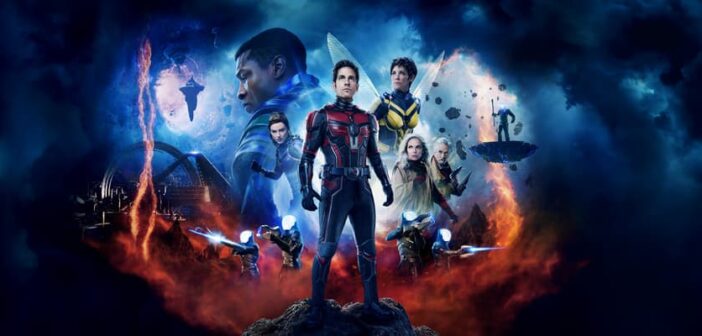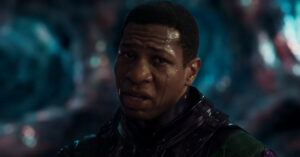Plodding along with an uninspired script, Ant-Man and the Wasp: Quantumania doesn't instil much mania for superheroes.
The newest addition to the Marvel Cinematic Universe is Peyton Reed’s Ant-Man and the Wasp: Quantumania, following the events of Endgame through the eyes of the Lang and Van Dyne family, with the main cast returning plus new additions of Kathryn Newton and Jonathan Majors. In a chaotic series of events that lead the family into the Quantum Realm, they find themselves exploring a past that was long buried . . . for good reason.
Ant-Man and the Wasp: Quantumania is disappointing. The Ant-Man films started off with a joyous bang, bringing us beloved Paul Rudd as the titular superhero and a funny wit that rivalled Guardians of the Galaxy; however, the newest film feels like a limp balloon. The odd pacing, shallow and directionless plot, and jarring editing make the film feel like a complete waste of 2 hours of your time.
Where films introducing audiences to a new landscape flourish in their ability to bridge the gap between the old and the new, Quantumania’s divided attention makes the Quantum Realm uninteresting and hollow. A place which should evoke fascination with sprawling, spiralling cityscapes visually feels like a fever dream and lacks vitality and depth. The new slew of characters brought in to fill in the holes and give life to the Quantum Realm feel insignificant, and not enough time is spent with them to solidify their part in the plot. Characters like Jentorra (Katy O’Brian) and Lord Krylar (Bill Murray) are inconsequential and fail to become full-fledged entities of their own, and in Jentorra’s case – who is important as the insurrection leader against the tyranny of Kang – she is overshadowed by the film’s inability to balance its own storylines. Leaning more towards re-joining the family together after becoming split up upon entering the Quantum Realm while evading death, the film tries to take on more than it can carry and suffers for it.
As such, Cassie Lang, who is introduced to us as a political activist at the beginning of the film, carries this torch haphazardly throughout the film. Simultaneously, the film throws out concepts and ideas of revolution and fighting against the oppressor, even going the length of name-dropping ‘socialism’. But that’s all there is. During the final conflict, Hank begins to talk about ‘socialism’ as a “controversial topic” but then trails off without really saying anything poignant, which is exactly how this film handles these themes. They’re just things being spoken into the air with no real depth, nuance or desire to explore them beyond surface-level visuals and labelling.
Jonathan Majors’ performance in this film, though, was one of its strengths. The antagonist, the source of fear for Pfeiffer’s Janet Van Dyne, is played with an emotional complexity which draws you in. Majors’ ability to juggle this interesting sadness, calm and gentleness in his voice and actions, but then contrast it with sudden bursts of eccentric anger and desperation is a highlight of the actor’s skill.
Unfortunately, though, the strange pacing and divided attention mean that there’s never enough set-up for antagonists in these films. Now, you might say that Kang appeared in the last dregs of Loki. However, films should be able to stand on their own. If a film has to rely on a set-up given from a completely different project, what really is the point here? The franchise which had succeeded earlier with this kind of system now suffers from the fact that each film needs to set up and lead to the next. At this point, every film feels like a series of steps taken to get to the point, but because these steps are so poorly constructed, the final point doesn’t even matter anymore. It’s unfortunate because the concept could be interesting and the characters could be more captivating, and we as an audience could care more, but we are left dangling almost constantly that it is becoming difficult to enjoy even just having an okay-ish film.
Overall, the film was visually fun, but regrettably lacks in everything else.





